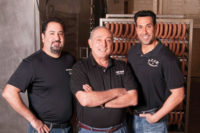Located about an hour west of Toronto, Heidelberg, Ontario, is a small town that is ideal for people looking to get away from the big city or visit a local farmer’s market. With a strong agricultural base, it’s the kind of town where a small butcher shop/grocery store can pick up a loyal customer base by selling fresh, local products. Heidelberg also happens to be home to one of the fastest-growing, technologically advanced companies in Canada. In both cases, that company is Stemmler’s, which utilizes cutting-edge technology to further its traditional-minded mission.
“We are a family business, and I like to think that we’re a part of the community and helping other families,” says Kevin Stemmler, who represents the second generation of the business along with his two brothers, Shawn and Terry.
Stemmler’s products can be found throughout the province of Ontario, but most of the company’s retail sales come from its 1,500 square-foot retail space, which is stocked with meats, cheese, produce and other products that are all locally made. On a Saturday, Stemmler says that as many as 1,000 customers can visit the store.
The company produces fresh meat, as well as different flavors of bacon, more than 30 varieties of sausages, pepperettes (aka snack sticks), hams and other products. The area has a German heritage, so Old World favorites are popular sellers — the summer sausage recipe that Stemmler’s uses is more than 100 years old. The company has won more than 30 awards for its products at various competitions.
Ever since the company expanded 10 years ago, tripling its size, the company has seen steady and significant growth. Stemmler’s was recently put on Canada’s Profit 500 list, which tracks the country’s fastest-growing companies. It was one of only 18 food companies on the list.
“We’ve experienced sales growth in the last eight years of 250 percent,” Stemmler says. “We think we’re on the right track for the future, and our goals include possibly another expansion, where we could double our size. We seem to have had the Midas touch in the last 10 years or so.”
Ahead of the health curve
Gerard Stemmler, a butcher by trade, decided in 1985 to go into business for himself. Along with his wife, MaryAnn, and one other employee, the business worked out of the family garage until they could raise enough money for a storefront. Their sons all helped out as well. Twenty-eight years later, the company has grown to 40 employees, and the sons have taken over the daily operations of the business. Gerard and MaryAnn can still be found at the store, usually working in the cutting room or at the cash register, respectively.
Stemmler’s products can be found in restaurants and retail locations in Ontario, and a new market with incredible potential is the healthcare industry. Hospitals, long-term care facilities and senior living centers all need meat products with some formulation changes — less sodium, for example — and Stemmler’s can accommodate those ingredient requests. The company has been doing it almost from the start.
“We’ve been dealing with celiac disease for over 25 years, and it’s really something that’s been addressed only in the last 10 years,” Stemmler says. “People would come in and ask us to change this recipe or that recipe, because an ingredient didn’t agree with them. So, we would find ways around their health problems.”
At the onset, the company made those accommodations to gain business, but as more information came out about gluten allergies and celiac disease, it became a natural extension of the company’s philosophy that focuses on caring for Canadian families.
“If you sit down to eat as a family, it should be one meal,” Stemmler explains. “If you have a food allergy or a sensitivity, often you’re making two meals. Well, if we can make a product to address those needs and still be award-winning, now we’re on to something. Now that family can sit down to one meal and enjoy themselves.”
With such a lengthy background in providing healthier sausages and other bacon products, it comes as no surprise that Stemmler’s will be focusing its efforts on marketing to the healthcare industry in the coming years.
“We think it’s an underserviced area,” he remarks, noting that the company has worked with some facilities for several years, changing the company to better service the industry. “I think we’re ready to now start addressing it a lot more and creating those relationships.”
The other area where Stemmler’s excels is in delivering fresh, locally sourced foods, including an array of cheeses, breads, and pastries. By supporting the local agricultural community, the company is carrying on its emphasis on supporting Canadian families.
The freshness of its products is an important selling point for the company, notes Terry Stemmler. When he needs to stock the store with turkeys for the holidays, he says, “I’m not on the phone talking to a distributor, I’m talking to the farmer. I have that direct contact. He takes them to an abattoir to be slaughtered, and then he brings them directly to me.”
By eliminating the middle man — in this case, the distributor — Stemmler’s is able to have a quick turnaround time with its fresh meats, to the point that customers at Christmas time can buy a turkey that may have been alive just a day or two before. The company is also able to provide processed meats like sausages and hams that don’t contain preservatives, which also resonates with its customer base.
Kevin Stemmler notes that the push for local meats in Ontario took off after high-profile recalls involving some larger processors. He said that customers started looking for alternatives and more local companies like Stemmler’s.
“We noticed, for example, hits to our website going up,” he adds. “People were obviously looking for us. One company’s difficulty became a very good thing for us. It’s an unfortunate way that it happened, but I’m glad that people are taking an interest in what we do.”
While a food safety scare may send a consumer to a local grocery store one time, it’s the quality of the product that will cause them to come back again and again, and as Stemmler’s growth has shown, consumers are returning to the store on a regular basis.
“We always felt that people would find their way to that philosophy, and they have,” Stemmler says.
With the growth the company has enjoyed, it might be tempting to become federally inspected and reach out to a larger audience, but the family has chosen to stay smaller in order to better accommodate that philosophy. Getting too large would make it virtually impossible to continue to support the local economy.
The other fear is that the quality of the product, which has long been Stemmler’s hallmark, would be adversely affected if it were to start shipping product to Vancouver, for instance. Terry notes that in order to reach outside of Ontario, the company would have to add preservatives to its products in order to cover the longer distribution times.
“Our product, staying true to not having a lot of preservatives, will not be able to handle long distribution times,” he says. “Distribution times can highly impact the quality of the product, to where it’s not as consistent. We know what our market is, and we’re not going to get out of it.”
The net result of the company’s philosophy is that Stemmler’s makes an emotional connection to its consumers with the food it sells. That connection could be through the attributes of “local” or “fresh,” or through the personal interaction between the retail employees and the shoppers.
“I think that’s something that’s being lost a little bit — it’s becoming impersonal,” Stemmler says. “With big grocery stores, you see product on a shelf. You come in here, you can talk to us, and we’ll tell you the story of where the product comes from. It becomes emotional as soon as you know the story.
“I really do believe that with small companies, what will make you successful in whatever area of the world you’re in is making it emotional and personal.”
Forward thinking
Stemmler’s facility, when it was built in 2006, was built to the federal inspection standard, even though the company had no intention of becoming federally inspected. Kevin Stemmler says that at the time, they wanted to hold themselves to a higher standard. As a bonus, the company has avoided many headaches since then, as the provincial inspection level has come closer to the federal level.
The building itself is 6,000 square feet in size, including the retail area. Gerard Stemmler insisted on the addition of large windows in the walls connecting the processing the retail areas, so that shoppers can see how the meat products are made. Other innovations in the building weren’t made for transparency’s sake, but they do make Stemmler’s a cutting-edge meat processor.
The water the company uses in the processing of its meat products is ultra-pure reverse-osmosis water, and it passes through a fine filter and two ultraviolet light systems before being used. Reverse osmosis is a high-pressure method of removing impurities from water. It is most often used in the desalination of salt water to create potable water, and its food applications include the dairy and maple syrup industries. Stemmler’s also utilizes a water treatment plant that releases drinkable water back into the environment. Even the air in the plant is continuously treated to eliminate any pathogens.
Stemmler says that the family members travel to Europe to see the new improvements in technology, as well as new flavor profiles and other ideas for the company.
“If you really want to find out what’s going on in the world and meat manufacturing specifically, a very successful small meat processor probably will have the state-of-the art things, to compete with the big guys. At times even before,” he adds.
Even new casings can provide the genesis for a new product idea. During the holidays, Stemmler’s produces summer sausages in casings shaped as Santa Claus and Christmas stockings that were brought back from Europe. This is an early adaptation made years ago to make its food more unique and personal.
“The fun part is that we implement new ideas and concepts quickly, because we’re smaller,” he says. “With the federal guys, it can take them much longer.”
The acceptance of cutting-edge technology works hand-in-hand with the company’s otherwise simple philosophy. Simple — yet extremely effective.
“Some of our principles are firstly to make food personal and fun and connect people to what is going on their plates from the local agricultural area. This creates loyalty,” Stemmler says. “Then we use innovation, insight and opportunity to grow the business.”











Report Abusive Comment